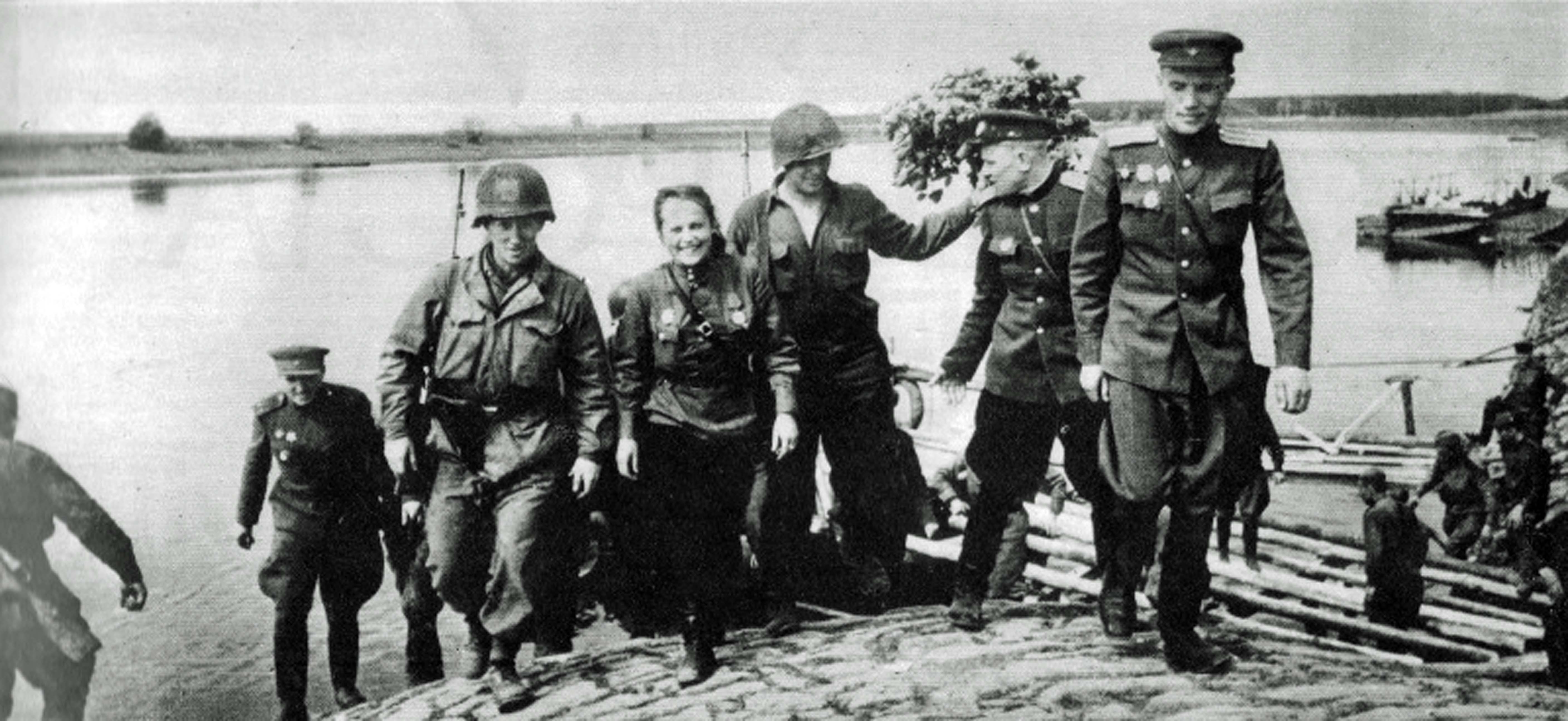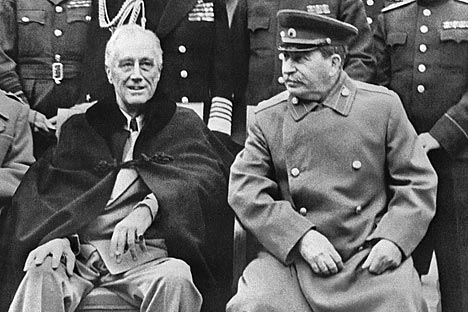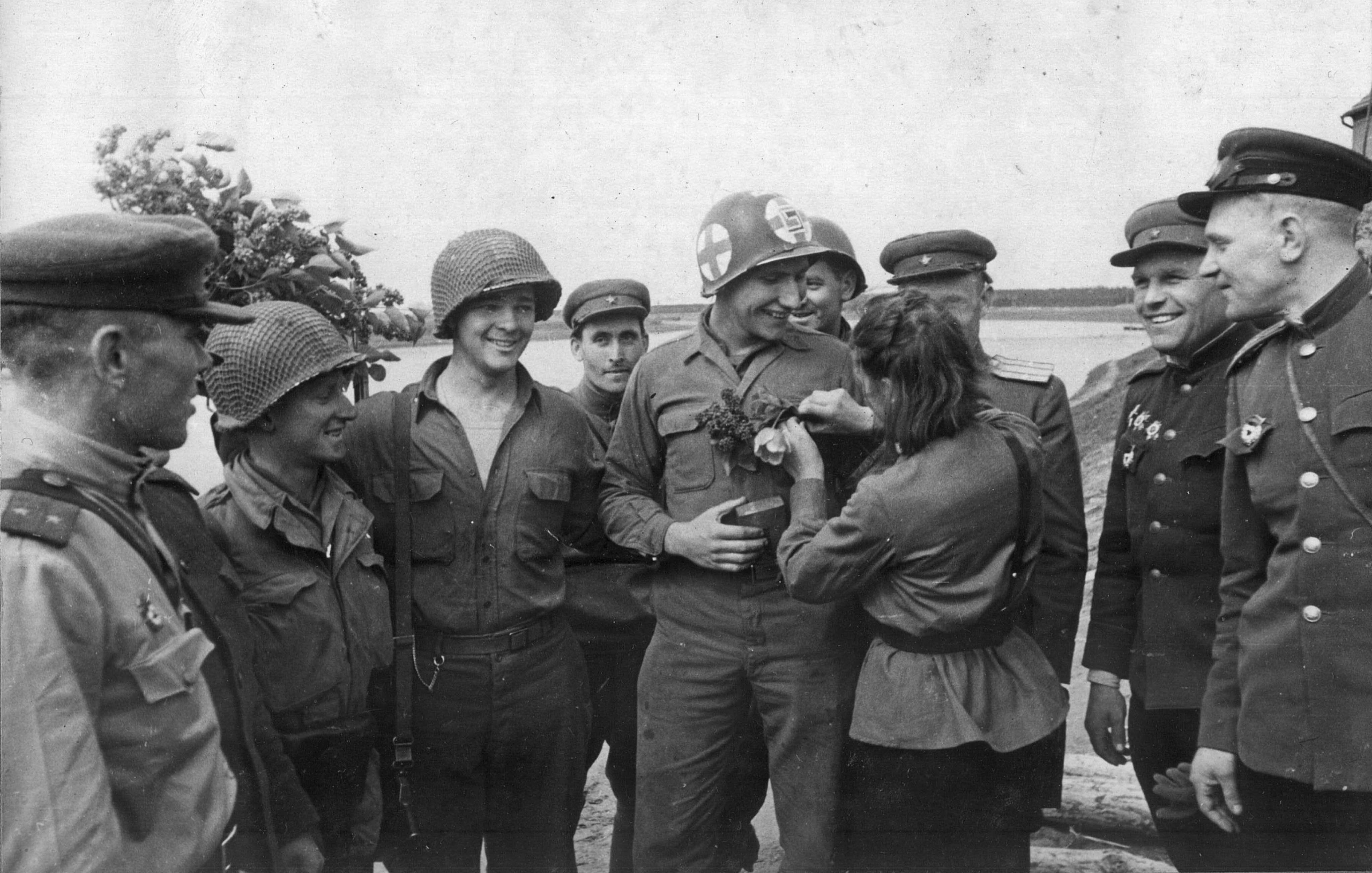 Soviet officers and American soldiers met up at the Elbe River near Torgau, Germany, 25th April, 1945
Soviet officers and American soldiers met up at the Elbe River near Torgau, Germany, 25th April, 1945
Unusual for a Saturday evening, the White House and the Kremlin upgraded their websites simultaneously to feature a joint statement by the two presidents on “Commemorating the 75th Anniversary of the Meeting on the Elbe” (here and here). It is both a symbolic and strategic gesture.
The two big powers have reminded world capitals amidst the wailing sirens of ambulances ferrying Covid patients to their destination the halcyon days of Russian-American partnership and the contemporary relevance of that fabled bird in ancient Greek mythology to calm the wind and sea.
April 25, 1945 – known as Elbe Day – stands out as a dazzling moment in Russian-American relationship in all modern history when soldiers of the Red Army 5th Guards commanded by General Alexey Zhadov and the US First Army of General Courtenay Hodges embraced each other after meeting up at the famous German river near Torgau. The Yalta Summit had carefully choreographed the meeting, ensuring it would remain a friendly meeting. US President Franklin Roosevelt and Soviet leader Josef Stalin at Yalta Summit, USSR, February 4-11, 1945
US President Franklin Roosevelt and Soviet leader Josef Stalin at Yalta Summit, USSR, February 4-11, 1945
The “Moment at Elbe” marked the end of war in Europe. Two weeks later, the Red Army stormed Berlin. The rest is history. The Russians recall the event with nostalgia, Cold War hostilities notwithstanding. But the US (and its western allies) became incrementally reticent over time and an aversion developed since 2014 following the Ukraine developments.
A dismal point was reached in June 2019 when the world leaders joined Queen Elizabeth II and other heads of state to commemorate the 75th anniversary of D-Day. The one world leader who was conspicuously absent was Russian President Vladimir Putin. He wasn’t invited.
Putin put a brave face saying, “As to whether I was invited or not, we also do not invite everyone to every event. Why do I have to be invited everywhere to some event? Am I a wedding general, or what? I have enough of my own business. This is not a problem at all.”
Nonetheless, it rankled. It has been a longstanding Russian grievance that the Soviet Union’s massive sacrifices in World War 2 have been somehow overlooked in the West. Certainly, it was the Red Army that broke the back of the Nazi war machine after ferocious fighting in the great battles at Stalingrad, Kursk and Prokhorovka (the largest tank battle in history), which were indeed pivotal moments of World War 2.
Indeed, so much is there to recapitulate in order to put in perspective the decision by Trump and Putin to hold each other’s hands on a Saturday and signal that Washington cherishes the US-Russia camaraderie at Elbe.
Today, the wheel has come full circle. The Russia-US relations are once again confrontational. And in less than 10 months, the New START will expire, unless the United States and Russia acted to extend that arms control agreement for an additional five years. The treaty extension is a critical need of international security, for, in the absence of such a treaty, for the first time since 1972, there will be no constraints on US or Russian strategic arsenals.
In the absence of New START, the US and Russia will have to revise the assumptions and modernisation plans of their nuclear weapons and industry at enormous costs that they can ill-afford. The treaty provided transparency and predictability in global strategic balance. For example, the US receives a notification every time a Russian missile is deployed or every time a missile or bomber moves between bases, and every time a new missile is produced — and vice versa.
Clearly, without treaty extension, by coming February, arms control between Russia and the US as we know it is effectively over, which, given the underlying East-West tensions would create an extremely dangerous degree of unpredictability in the international security environment.
It is entirely conceivable that the Trump-Putin joint statement on Elbe anniversary signifies foreplay that may lead to an extension of the New START. In the past 3 weeks or so, Trump and Putin spoke to each other five times. Ostensibly, Trump made the first phone call to seek Putin’s help to cut oil production within the OPEC+ framework, but in no time the presidential exchanges extended to security issues.
Arguably, the OPEC+ deal that since materialised has turned out to be more of a byproduct of the presidential exchanges, while a nascent Russian-American engagement over strategic issues began appearing, which may become the more consequential outcome in the period ahead.
The big question is whether Trump would exercise his presidential authority to extend New START. In a phone conversation with Russian Foreign Minister Sergey Lavrov on April 17, US Secretary of State Mike Pompeo stuck to the formulation that “any future arms control talks must be based on President Trump’s vision for a trilateral arms control agreement that includes both Russia and China.”
However, the state department readout didn’t explicitly rule out a treaty extension. Equally, Lavrov has since said that a summit meeting of the permanent members of the UN Security Council may take place this year dedicated to a wide range of global stability issues.
To quote Lavrov’s remarks, “We are currently working on this summit with our colleagues. It should tackle the widest approach to ensuring strategic stability and global security in all dimensions. I hope that this summit will take place this year and that it will be useful for the entire global community.”
From Lavrov’s remarks, the wind seems to be beckoning toward a New START extension — possibly, as the highlight of the proposed P-5 summit meeting. Clearly, Moscow is pragmatically moving, looking for a new norm in the relationship with Washington during Trump’s remaining term in office, which is only possible if the present US-Russia confrontation ends.
 Soviet nurse Lyubov Kozinchenko gives flowers to the American military physician Carl Robinson, Elbe River, Germany, 25th April, 1945
Soviet nurse Lyubov Kozinchenko gives flowers to the American military physician Carl Robinson, Elbe River, Germany, 25th April, 1945
Trump too stands to gain from a foreign-policy legacy in an election year. Arms control, of course, is a foreign policy priority for Democrats and a hugely popular topic among Trump’s supporters — and the Pentagon commanders. Such rare “bipartisan consensus” gives New START renewal the attributes of a low-hanging fruit. Harking back to the Elbe Day cannot be coincidence.
